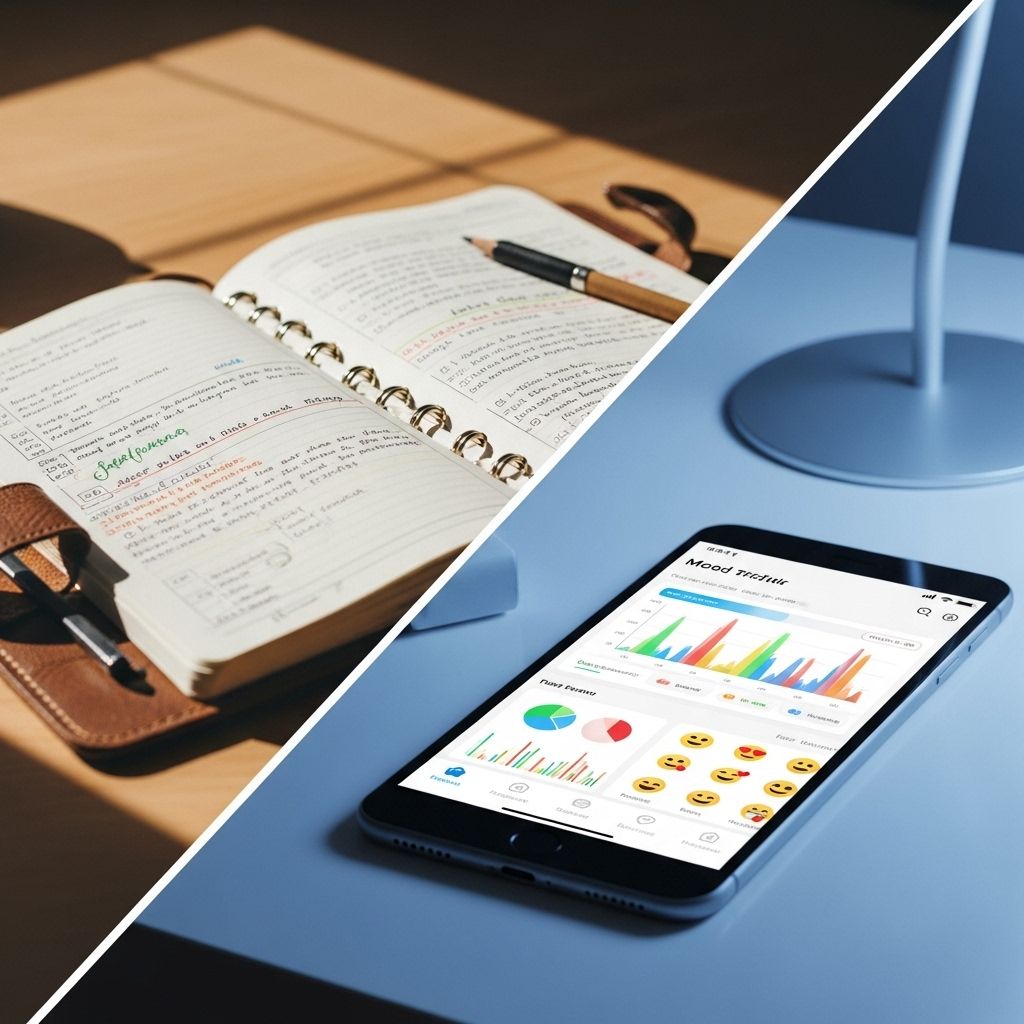Paper vs. Digital Mood Tracking: Pros and Cons
Explore hands-on journaling and high-tech tools to gain clearer emotional insights.

Mood tracking has become an essential tool for managing mental health, offering insights into emotional patterns and triggers. Two popular methods for mood tracking are paper-based journaling and digital apps. Each has its own set of advantages and disadvantages, which can significantly influence an individual’s choice based on their preferences and needs.
Introduction to Mood Tracking
Mood tracking involves recording and analyzing one’s emotions over time to better understand emotional patterns and identify triggers. This process can help improve mental health by raising awareness of emotional states and enabling proactive measures to manage anxiety, depression, and other mood disorders.
Why Mood Tracking Matters
Regular mood tracking has been shown to reduce symptoms of anxiety and depression by making individuals more aware of their emotional states. It allows them to take proactive measures, such as seeking support or engaging in self-care practices, to manage their mental health effectively.
Table of Contents
- Paper-Based Mood Tracking
- Digital Mood Tracking Apps
- Pros and Cons Comparison
- Choosing the Right Method
- Frequently Asked Questions
Paper-Based Mood Tracking
Writing down emotions by hand has been a long-standing method for mood tracking. Many people prefer this tactile process due to its ability to promote focus and mindfulness. There are no distractions from technology, allowing for a more introspective experience.
Advantages of Paper-Based Mood Tracking-
Tactile Experience
: The act of physically writing down feelings can lead to deeper reflection and a sense of accomplishment.-No Distractions
: Unlike digital devices, paper journals do not have notifications or other digital distractions, enabling a more focused and mindful experience.-No Need for Technology
: Individuals who prefer less reliance on technology or have limited access to digital tools can opt for this method. Disadvantages of Paper-Based Mood Tracking-Time-Consuming
: It can be more time-consuming to manually record and review emotions compared to digital methods.-Disorganization
: Without reminders or digital prompts, it’s easy to forget entries, leading to gaps in tracking.-Limited Analysis
: Paper-based tracking may not provide the same level of data analysis or insights as digital apps.Digital Mood Tracking Apps
Digital mood tracking apps offer a convenient and accessible way to track emotions. These apps often provide reminders to ensure consistent entries and offer features like mood analytics to provide insights into emotional patterns.
Advantages of Digital Mood Tracking-
Convenience
: Apps allow for quick and easy logging of emotions anywhere, at any time, as long as there is a mobile device available.-Reminders and Consistency
: Digital apps can send reminders to users, helping maintain regular tracking habits.-Data Analysis
: Many apps provide detailed analytics, helping users understand their mood patterns and trends over time.-Accessibility and Sharing
: Users can easily view their data and share reports with healthcare providers for more personalized care. Disadvantages of Digital Mood Tracking-Dependence on Technology
: Users need a smartphone or internet connection to access these apps, which can be a barrier for those without reliable access to technology.-Potential Distractions
: Mobile devices can be distracting, with notifications and other apps competing for attention.-Data Security Concerns
: Storing personal data on apps can raise privacy and security concerns.Pros and Cons Comparison
| Method | Advantages | Disadvantages |
|---|---|---|
| Paper-Based | – Tactile experience – No distractions – No need for technology | – Time-consuming – Prone to disorganization – Limited analysis |
| Digital Apps | – Convenient and accessible – Reminders for consistency – Data analysis and insights | – Dependence on technology – Potential distractions – Data security concerns |
Choosing the Right Method
Ultimately, the choice between paper-based and digital mood tracking depends on personal preferences and needs. For those who value the tactile experience and prefer less reliance on technology, paper-based methods might be more suitable. However, for those seeking convenience and detailed insights, digital apps are often preferred. Recent surveys indicate that about 56% of people prefer using digital mood-tracking apps, while about 34% prefer traditional paper methods.
Frequently Asked Questions
Q: Which method is more effective for mood tracking?
A: Both methods are effective, but electronic tracking tends to have higher adherence rates due to reminders and easy data access.
Q: Do mood-tracking apps provide better insights than paper journals?
A: Yes, digital apps often offer detailed analytics and mood patterns that can be more challenging to track manually with paper journals.
Q: Is it better to use a combination of both methods?
A: Using both methods can be beneficial, as it combines the tactile benefits of paper with the convenience and analysis of digital tools.
Conclusion
Mood tracking is a vital tool for managing mental health, and both paper-based and digital methods have their strengths and weaknesses. By understanding these pros and cons, individuals can choose the best approach for their needs and preferences, ultimately enhancing their mental well-being and emotional awareness.
References
- https://thelifeplanner.co/blog/post/mood_tracking_apps_vs_pen_and_paper_which_works_best_for_you.html
- https://mental.jmir.org/2020/5/e16237/
- https://pmc.ncbi.nlm.nih.gov/articles/PMC8387890/
- https://pmc.ncbi.nlm.nih.gov/articles/PMC5977660/
- https://news.wpcarey.asu.edu/20241101-boosting-positivity-impact-mood-tracking-mental-well-being
- https://news.harvard.edu/gazette/story/2023/08/mental-health-ills-are-rising-do-mood-tracking-apps-help/
- https://evolvecounselingpa.com/understanding-emotional-triggers-through-mood-tracking-a-guide-to-better-mental-health/
- https://www.frontiersin.org/journals/psychiatry/articles/10.3389/fpsyt.2021.687270/full
Read full bio of medha deb












